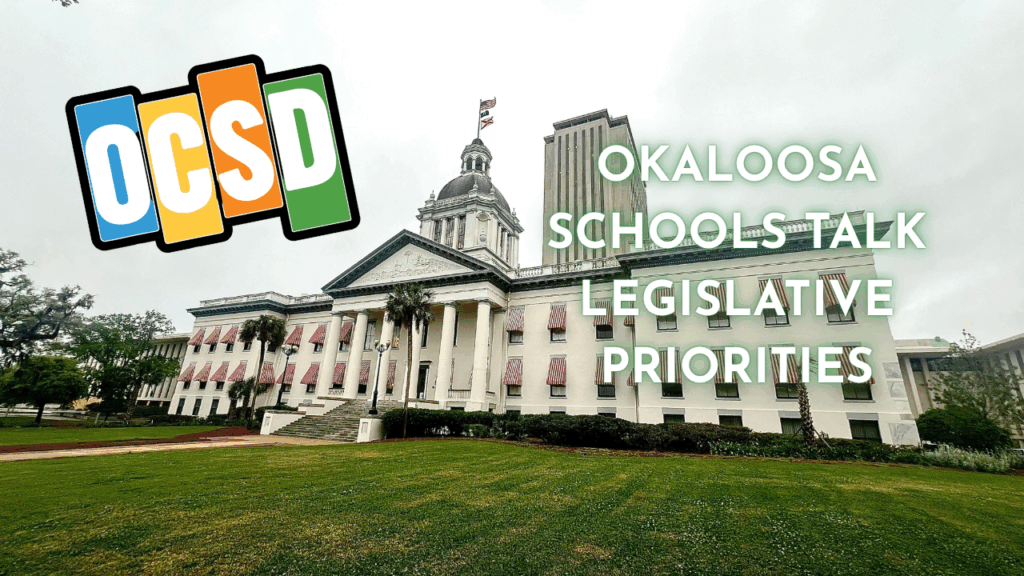
📚 School board pushes for fairer state funding and relief from costly mandates
🧠 District leaders urge stronger support for mental health and behavior services
🍎 Teachers face mounting certification costs and hiring challenges amid shortages
NICEVILLE — The Okaloosa County School Board outlined its 2025-26 legislative priorities on Monday, calling for reforms to Florida’s school funding model, expanding support for safety and mental health programs and relief from regulations that the district says hinder teacher retention and classroom instruction.
The meeting focused on what Chambers described as “specific, targeted priorities” to ensure the districts’ stability amid tightening budgets and growing state mandates.
Assistant Superintendent Lee Hale said the district worked with Oak Strategies, the Florida Association of District School Superintendents, and other districts to align Okaloosa’s goals with broader state education efforts.
Chambers said the district’s priorities fall into five categories: funding, school safety, student services and mental health, reducing regulation, and workforce recruitment and retention.
At the top of Okaloosa’s agenda is a call to increase the Base Student Allocation (BSA), which Chambers said rose only $41.62 per student last year — far short of what districts need to cover increasing costs in retirement, insurance and salaries.
“In essence, we’re going backwards,” Chambers said, noting that even a minimal 1% raise for staff would cost $108 per student.
Chambers also criticized how Family Empowerment Scholarships are withdrawn from district budgets.
During his reelection campaign, Chambers told Mid Bay News at a fundraiser that, “I thoroughly believe in a parent’s ability to have choices,” he said in reference to House Bill 1 – which provided school vouchers for all Florida children, “I think here in Okaloosa, and our surrounding counties, we have an excellent school system that is able to meet the needs of students. Families that want to go the private route, they absolutely can do so – and this house bill provides them the opportunity.”
Chambers proposed separating voucher funding from public school allocations, citing a $27 million hit to the district’s budget this year, including roughly $17 million tied to students who never attended the district’s schools.
“We’re funding private school education to the tune of $17 million,” Chambers said.
Board members voiced concern regarding the situation. Board Chairman Lamar White questioned whether the district has allies among other counties and state associations. At the same time, School Board Member Parker Destin warned that “separating funds for 67 counties could blow a half-billion-dollar hole in the state budget.”
School Board Member Linda Evanchyk emphasized the need for public awareness about the voucher program situation, saying citizens “had no idea about this Family Empowerment Scholarship and the implications on our school district.”
Another primary focus was textbook funding, which has not increased since 2012 despite steep price hikes from vendors. Chambers said the district receives approximately $1.8 million annually for instructional materials, although new adoptions often cost $5–6 million, forcing schools to draw millions from their general funds.
Chief Financial Officer Julie Perry noted that the state rolled textbook funds into the BSA years ago without raising allocations. “We end up with $1.8 million that you can use for adoption,” she said, adding that next year’s English Language Arts adoption alone will exceed $5 million.
On school safety, Chambers urged lawmakers to fully fund Safe Schools programs, noting that the district receives $2.76 million but spends over $8.5 million annually on school resource officers.
“We fund about $4.25 million from our own allocation,” he said, crediting support from the Okaloosa County Sheriff’s Office and County Commission but warning of growing strain.
District leaders also pressed for more funding for behavior analysts and interventionists, arguing that student behavior challenges have escalated post-pandemic.
Chambers called for expanded state support for mobile response teams and mental health counselors, saying access remains limited. “Without adequate services, students face barriers that disrupt learning and long-term achievement,” he said.
Hale presented reforms aimed at reducing regulatory burdens on teachers. He proposed easing certification renewal mandates, particularly ESOL and ESE point requirements, and called for reinstating the middle grades integrated curriculum certification to simplify staffing for self-contained special education classrooms.
Board members expressed frustration at the costs teachers face to maintain credentials — roughly $100 per subject test plus $75 renewal fees — with little support from the state.
“It’s really no wonder we’re not getting anybody in,” said Evanchyk, calling the rules “the most ridiculous thing ever.”
Hale also urged the state to eliminate the six-month waiting period before retired teachers can return to work, a move that mirrors recent exemptions for law enforcement. “There’s no sense in having vacancies that could be filled by professional educators,” he said.
Throughout the meeting, board members criticized what they described as unequal oversight between traditional public, charter, and private schools.
School Board Member Tim Bryant and White argued that while traditional schools face layers of mandates and accountability, voucher-funded institutions operate with fewer requirements.
“I’m all about competition,” Bryant said, “but if you’re going to compete, let’s do it fairly.”
Chambers concluded by reaffirming the district’s commitment to advocacy despite potential pushback from state leaders. “Some of these topics are lightning rods,” he said, “but we would not be doing our job if we didn’t advocate for these areas.”
“There’s nothing more important than public education; it’s the great equalizer,” Chambers added.
Register or login with Mid Bay News and never get another pop up on our site!